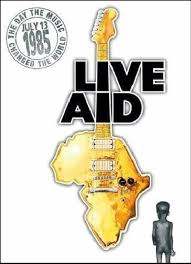The Lasting Impact of Live Aid on Music and Philanthropy

Introduction to Live Aid
Live Aid, held on July 13, 1985, was a dual-venue benefit concert aimed at raising funds for famine relief in Ethiopia. Organized by musicians Bob Geldof and Midge Ure, the event is considered one of the most significant philanthropic efforts in music history. With an estimated 1.9 billion television viewers across 150 countries, Live Aid showcased the remarkable power of music to unite people for a common cause, highlighting the importance of social responsibility among the entertainment industry.
The Events of Live Aid
The iconic concert took place simultaneously at Wembley Stadium in London and John F. Kennedy Stadium in Philadelphia, featuring performances from an array of legendary artists including Queen, U2, David Bowie, and Led Zeppelin. The global reach of this event was unprecedented; it raised approximately $125 million for famine relief, which contributed to the immediate needs of those affected by the crisis in East Africa. Live Aid not only provided crucial funds, but also raised awareness about global poverty and the effects of humanitarian crises.
The event’s impact was particularly notable for the memorable performances that transcended cultural barriers. Queen’s electrifying set became one of the most celebrated in rock history, while U2’s passionate appearance resonated deeply with audiences, solidifying their status as major global artists. Additional acts such as Elton John, Madonna, and The Who reinforced the concert’s diverse musical lineup, uniting fans from different backgrounds around the world.
Legacy and Significance
In the years since Live Aid, the concert’s legacy has continued to inspire numerous fundraising efforts across the globe. It ushered in a new era of benefit concerts, including events like Live 8 and the Concert for New York City, exemplifying the potential of music as a force for good. Moreover, it opened dialogue about the responsibilities of artists to use their platforms for social change.
Through the years, Live Aid has been commemorated in various ways, from documentaries to anniversary concerts that honor its history and underline the ongoing issues of hunger and poverty. The establishment of the Band Aid Trust to manage the funds raised highlighted a continued commitment to aiding those in distress.
Conclusion
Live Aid remains a pivotal moment in music and humanitarian history, demonstrating that when artists come together for a worthy cause, the impact can be monumental. As we reflect on its significance, it serves as a reminder of our shared global responsibility to aid those in need, inspire future generations, and harness the power of music as a catalyst for change. The continuing relevance of Live Aid reinforces the idea that even a single event can alter the course of history.









